Published on September 16, 2025 10:01 PM GMT
Introduction: The Effect of Technology
The Internet has had a tremendous democratising effect on communication. All technological leapfrogs tend to have such an effect - they radically expand access to things previously reserved for a select few.
Before the invention of the Printing Press, for example, only the elite—the clergy and nobility—could print or disseminate written works.
Electricity, similarly, democratized automation. Earlier, only certain industries or the wealthy could command labor and mechanical energy. Electricity made lighting, heating, and mechanization available to ordinary homes and small businesses.
The steam engine democratized mobility and production, and the microchip democratized computation.
What technology essentially leads to is class dissolution, and it does so not by destructive means like redistribution of resources but by creating physical abundance. When a certain utility is no longer scarce, the masses gain access to it, and the resulting productivity gain lays the groundwork for the next technological breakthrough. This pattern lies at the heart of human civilizational progress.
Taste
But the class dissolution caused by the Internet brought with it a peculiar problem.
When it comes to information consumption, every single human on earth is justifiably class-conscious. And here, class pertains to Taste, not wealth.
If you are an old zoomer, like someone born in the year 2000, you may have grown up with a TV at home where people would watch the news. Certain news channels would have a reputation for theatrical panic: fearmongering and sensationally shouting about alien encounters and hideous crimes all the time. You may have tuned into them once in a while for entertainment, but for your daily dose of headlines and to get information on important events, you would probably avoid them and prefer other, more serious channels (back when mainstream journalism had substance anyway).
You would also only watch movies that meet a certain benchmark of production quality. Even in your favorite genre, you would likely not watch random B-grade trash that puts zero effort into the story, direction, and visuals.
The generation before us used to depend on curated magazines, and people would prefer certain newspapers based on the kind of editorials and op-eds that got published in them. You would pay more to get curated content written by tasteful intellectuals.
Similarly, at school, your definition of a good conversation was not the same as everyone else’s, and you would filter out the people you make friends with depending on the quality and enjoy-ability of conversations and other interactions that you had with them.
This discrimination is healthy human behaviour. You need to curate your aesthetic experience of the world. Yes, once in a while, you would want to experience something that is otherwise cheap and shallow out of curiosity or a craving for novelty, but for most of your waking hours, you need to expose yourself to the good stuff to get the nourishment and growth that is necessary for a mind like yours.
If you don't curate your exposure, you'll be perpetually distracted, feeling unpleasant and tired all the time from your mind being stretched in all directions and revolting against the lack of intellectual standards and aesthetic coherence you are subjecting it to. This is exactly what you feel when you spend too much time on the internet.
The Great Digital Enshittification
The Internet doesn’t let you sit with your friends at the lunch table. It plants you at the centre of the city with the cacophony of the masses ringing in your ears.
It is a mistake to think that most people on the internet are like you. They are not. The disgust that you feel after wasting hours on the internet: the majority of internet users are perfectly fine with it. They don’t share your sensibilities. They do not have those baseline aesthetic requirements that you do. Yes, the psyche of the average human might surprise you.
We keep hearing a narrative that people who are building AI software startups today don't really understand their customers. You'll see dozens of AI coding tools coming up, and dozens of AI research tools coming up. But who uses these outside the bubble of our industry?
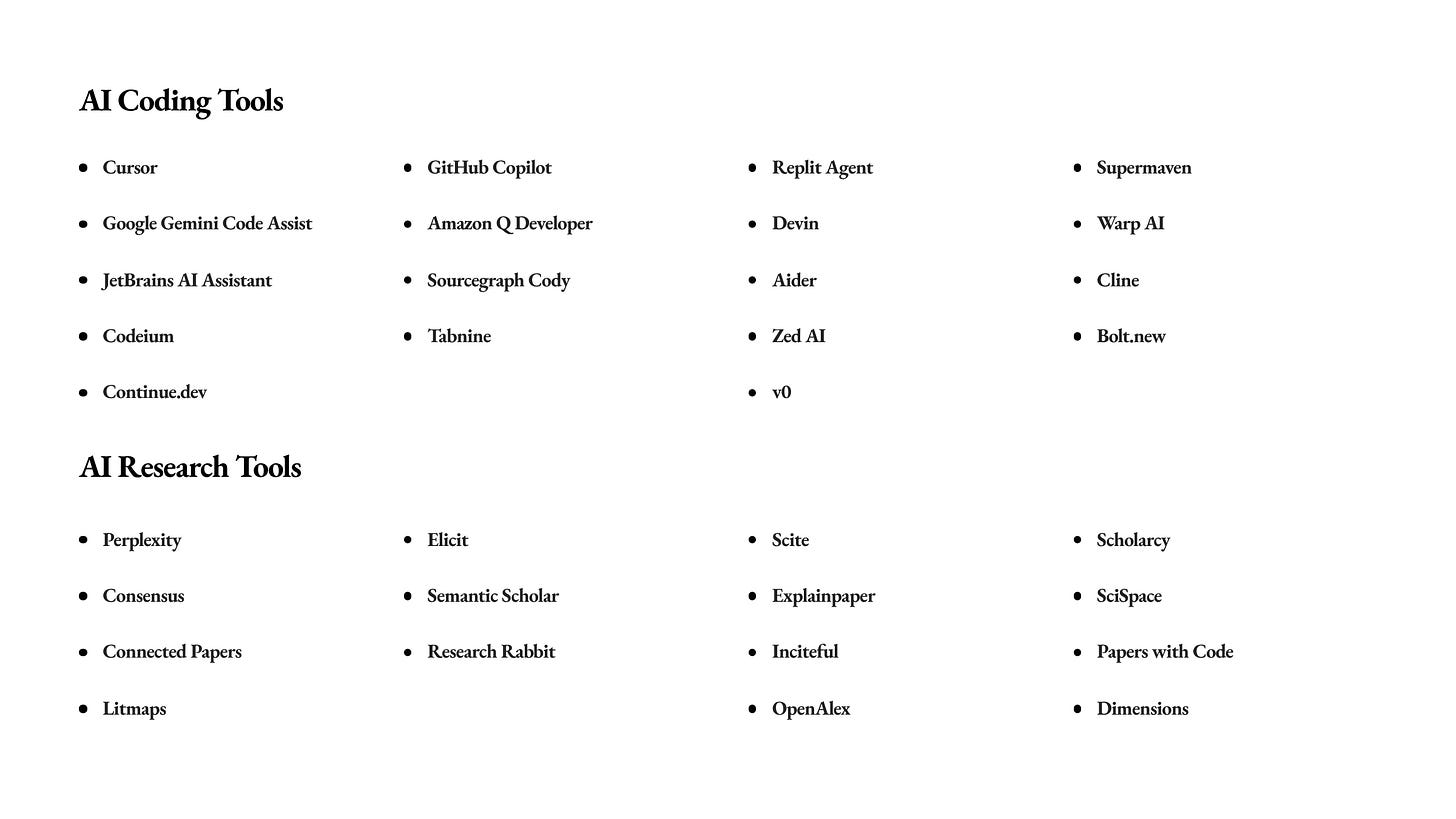
Most people use AI to play out their fantasies. For most people, ChatGPT is more of an entertainment tool than a productivity tool.
Similarly, for most people, media consumption is not a means to inspire contemplation; it is more of a means of escape. If you wonder why the average big-budget film produced today is of such low quality compared to similarly priced productions back in the days when distribution was expensive, well, it’s because that’s what sells. People pay for escapism.
So if you're wondering why the algorithm is so trash, why it gives you these sensational ragebaits all the time: It's because it is not made for you. If you compare the number of views on the highest-grossing educational or edutainment videos on the internet vs. the highest-grossing brain-rot videos, you would see there's an order of magnitude difference. You — people like you — are actually quite alone. You belong to a minority of humans who are capable of confronting existential dread, who are capable of feeling disgust at a meaningless life, and who are capable of being fatigued from scrolling too much.
Think about it: YouTube was not uninteresting before the advent of short-form. You enjoyed it as much as you enjoy it today. Perhaps even more. Short-form content was not introduced to bring you to the platform because you were already a satisfied customer of YouTube. It was brought in to onboard and increase the viewership of an entirely different consumer persona, who found the old YouTube boring. And it was a success because this consumer group contributes to much higher watch hours today than your group.
The algorithm on most social media sites is never going to cater to you (democratized as it is); it is going to cater to the majority of the population on the internet, who are nothing like you.
The Attention Tax Bracket
This is where I shall introduce the term "Attention Tax Bracket."
Your Attention Tax Bracket is determined by the aesthetic and intellectual complexity of the content that you need for your well-being. If you lie in one of the higher brackets, the kind of media you need to consume for your own intellectual nourishment and sanity is going to be expensive - not in terms of money, but attention.
To explain with an example, the same Netflix subscription can give you access to both an Akira Kurosawa movie and a shitty, borderline brain-rot movie. Even if you decide to watch the Kurosawa movie, you need to pay attention. Not for 120 seconds, but for hours. Do you even have that much attention in your pocket? Or are you too attention-poor to buy the Intellectual nourishment you need?

You might think that your attention span is all but destroyed by now, but as per my biased and arbitrary opinion, that would be a grave misjudgment. Under the right circumstances, you can read books or play video games for hours on end, and sometimes you are even able to focus on your work for similarly long periods of time: what we call deep work.
So it's not like you’re attention-poor. It's just that on the internet, there are hundreds of different things that suck away and deplete your attention.
Your attention is like a limited resource, and you expend too much of it on informational fast food such as short-form video and ragebait.1 You’re not doing so out of choice; you are being tricked by the algorithm, which basically creates a path of least resistance to consume cheap, mindless content.
By the time you reach the Kurosawa film, you are restless and fatigued. And then as you feel sick and disgusted with yourself, you expend the remainder of your energy consuming more cheap content to escape the bad feeling. This is the Poverty Trap of the Attention Economy.
To experience the intellectual stimulation and philosophical education that a person like you needs, you must go back to curating your exposure again. You have to go back to being class-conscious like a healthy human. You have to find ways to look past the shiny recommendations pages. And you need to do that on YouTube, on Netflix, on X, on Amazon, basically every single place you visit on the internet.
This is the full picture of the Attention Tax Bracket: the higher you sit in the taste hierarchy, the more you pay not only for consumption but also for curation.
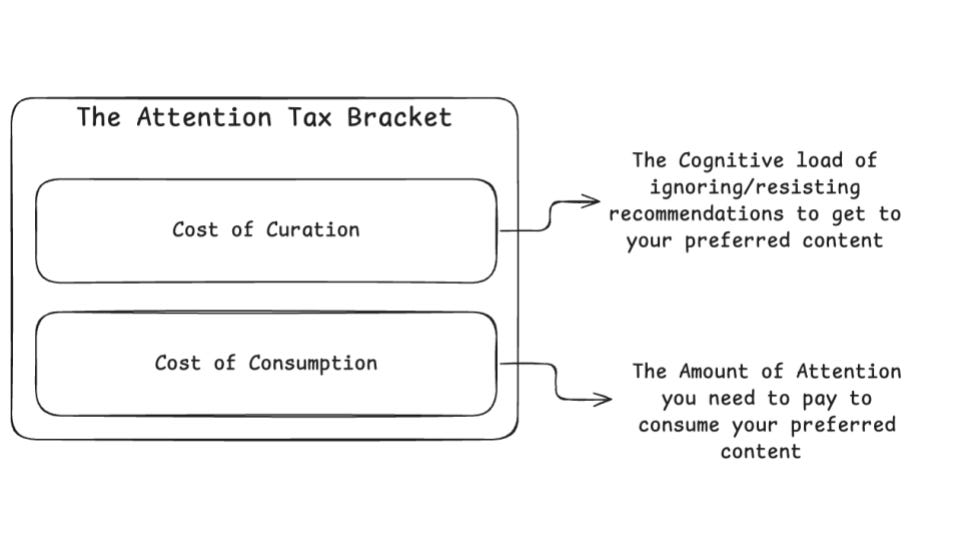
The cost of curation is the actual tax. It is the cognitive load of filtering through dopamine-optimised recommendations.
If you are in the lowest attention tax bracket, you just lap up whatever bile the algorithm throws at you. Your tax is essentially zero: you don't need to curate anything.
If you’re in one of the highest brackets, your tax is so high that you will need to invest in technology, systems, and habits that will reduce your curation cost. You basically need to evade your attention tax.
I wish there were a universal playbook to get this done. Even better would be a software that filters our entire internet experience. I tried to build one for myself about a month ago, and it's a hard problem to solve.
But there exist several practical workarounds that we can try today.
On YouTube: Clear and pause your watch history2. You will stop getting “personalized” recommendations on your homepage; you'll only see content that you search for. This is one of the best quality-of-life improvements you can gift yourself on the internet today.
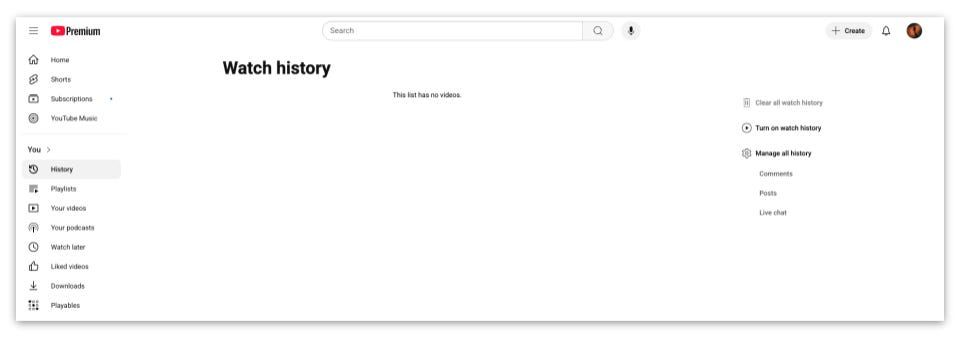
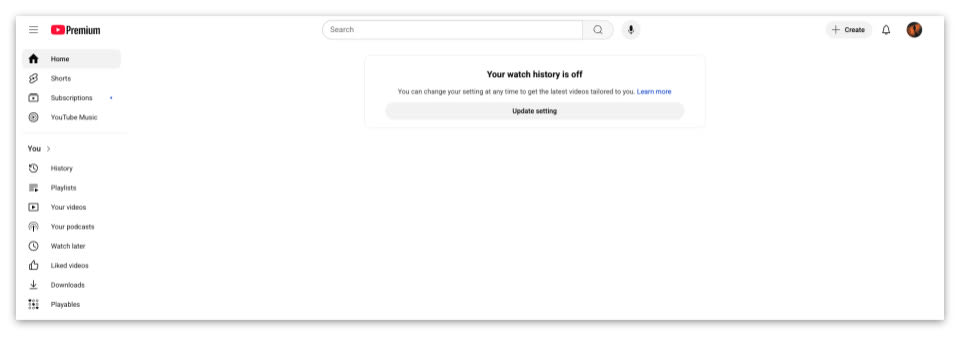
On X: You’ll see several tabs at the top of your feed. Avoid the For You tab and stick to the Following Tab.
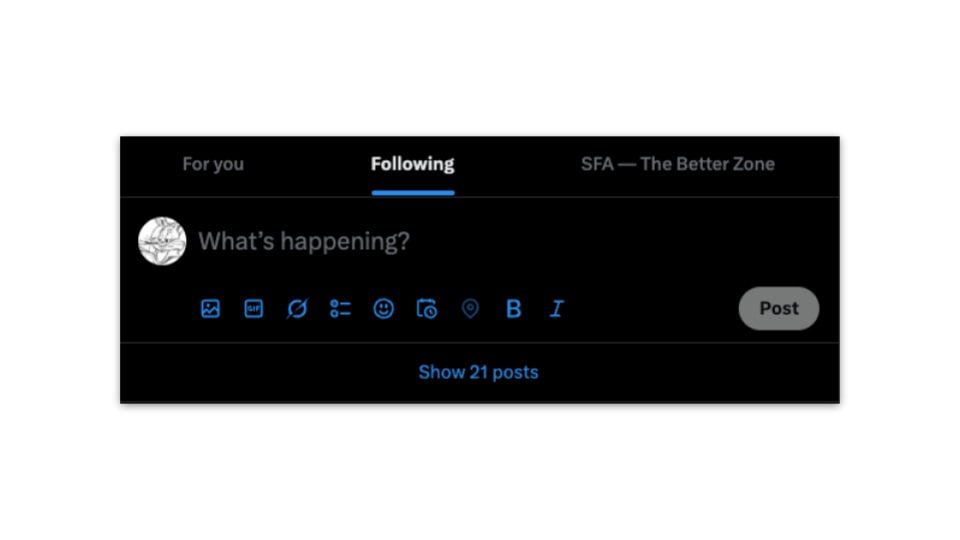
When using X on your desktop browser, disable the For You feed entirely using extensions like Undistracted. You can also create alternative feeds by creating Lists on X and pinning them. Only put high signal-to-noise ratio accounts on these lists.
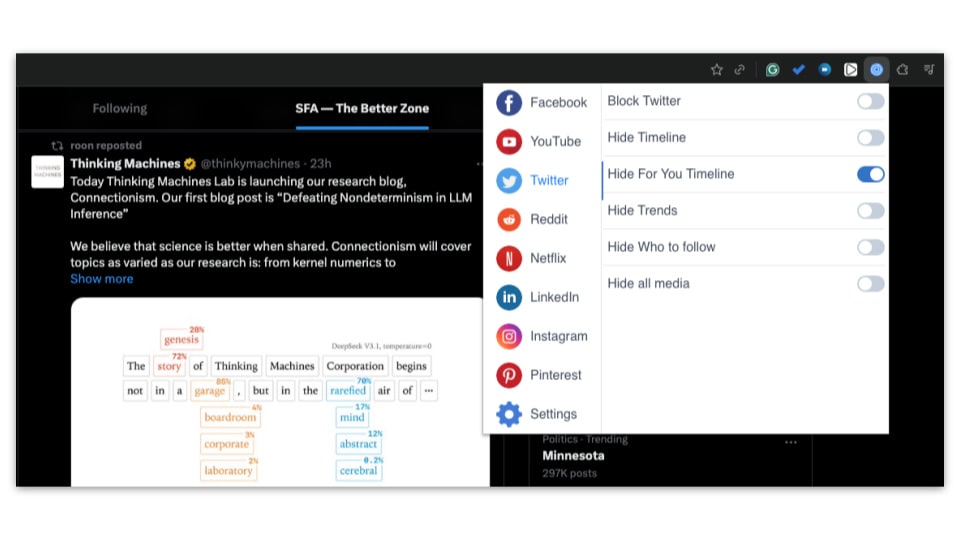
Use RSS readers like Feedly to aggregate newsletters and blogs. Substack is very quickly becoming the hub for high culture on the internet, primarily because it caters to consumers who want curated media. It doesn’t trap you in recommendation loops because its business model isn’t dependent on optimizing for metrics like user time-on-site.
(These strategies represent curation rather than abstinence. The mistake people often make is blocking entire social media platforms, which is impractical. You don't want to block out the little social interaction you get in this age of loneliness. This is why blocking a social media site or uninstalling social apps from your phone never really solves any problem. You always end up relapsing.)
Discuss

